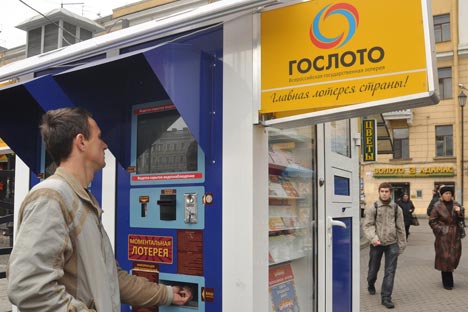
After numerous cases of fraud in the 1990s, most Russians have no interest whatsoever in lotto. Source: PhotoXPress
After completing the first audit of the company in 20 years, the government has concluded that continued existence of Russian Lottery as a state-owned venture does not make economic sense.
The verdict announced by the Audit Chamber’s inspector, Sergei Agaptsov, was damning: “Most of the money invested by the government into Russian Lotto has been irretrievably lost.”
The Russian lotto industry has been going through a rough patch over the past few years, so the results of the Russian Lotto audit come as no surprise.
Since it was set up back in 1995, the company has been merely a distributor of lottery tickets; it has not conducted any lotteries of its own. It made a paltry 61,000 rubles (less than $2,000) in net profit in 2011 and 40,000 rubles in 2012.
Some experts suggest that the Audit Chamber’s announcement signals the government's intention to reform the entire lotto industry.
First Deputy Prime Minister Igor Shuvalov had previously instructed the Finance Ministry to draft amendments to the law on lotteries that would leave only stimulus and state-owned lotteries in business.
Once the proposed amendments have entered into force, there will be only two players left in the market — Gosloto, which is run by the Sports Ministry, and Sportloto, run by the Finance Ministry.
Some of the market players argue that the main problem of the Russian lotto industry is lack of proper regulation, as well as lack of interest in lottery among the general public.
According to the La Fleur 2013 World Lottery Almanac (a lotto market survey focusing on the United States), Russia accounts for only 0.13 percent of the global lottery market, which is worth an estimated $275billion.
According to the available statistics, only 7 percent of Russians regularly buy lottery tickets, compared to more than 70 percent of Europeans and more than 80 percent of Americans.
Such manifest lack of interest in lotto among Russians is the product of their lack of confidence in lotto operators, experts say. They cite numerous cases of lotto fraud that have come to light over the past two decades.
One of them happened with the Syurpriz instant lotto in 1992. The lucky winner came to Moscow from Rostov Region to claim his prize — a Peugeot car — only to be told by the organizers that his ticket was counterfeit.
Sberbank figures released in 2011 suggest that the average Russian spends only 45 rubles (about $1.5)a month on lotto tickets; this is one-twentieth of the figure in Poland. The average European spends about 13,400 rubles ($420) a year on lotto.
According to The Financial Times, 3,000 people became millionaires between 1995 and 2013, after winning the U.K. National Lottery. Even though U.K. lottery tickets have recently gone up in price to £2 (about $3.20), the move has not caused any public anger.
After all, almost a third of the money spent on the ticket goes toward various good causes, such as sports, arts, and films. For example, some of the lottery money helped to finance director Tom Hooper's Oscar-winning film,“The King's Speech.”
After it was announced that London would host the 2012 Summer Olympics, the U.K. National Lottery said 28 percent of the price of a lottery ticket would go toward the cost of the Games.
In the end, the company raised £750 million ($1.2 billion) toward the cost of the London Olympics.
In Spain, meanwhile, the ONCE lottery has become enormously popular among pensioners. Almost half of those who purchase ONCE lotto tickets are over the age of 65.
ONCE is an acronym that stands for the Spanish National Organization of the Blind. The money raised by selling tickets goes toward supporting the blind.
Almost 90 percent of ONCE employees are also blind. For that reason alone, many Spaniards buy ONCE tickets — not only because they hope to win, but also because they want to give aid to those who need it.
In Russia, lottery used to be quite popular back in the 19th century. Then, during the Soviet era, people would often be denied the right to buy goods that were in short supply unless they also bought a lottery ticket.
Now, after numerous cases of fraud in the 1990s, most Russians have no interest whatsoever in lotto. Few are persuaded by the promise that some of the money they pay will go toward charity, either. Many people in Russia simply do not believein the good intentions of charity organizations.
All rights reserved by Rossiyskaya Gazeta.
Subscribe
to our newsletter!
Get the week's best stories straight to your inbox